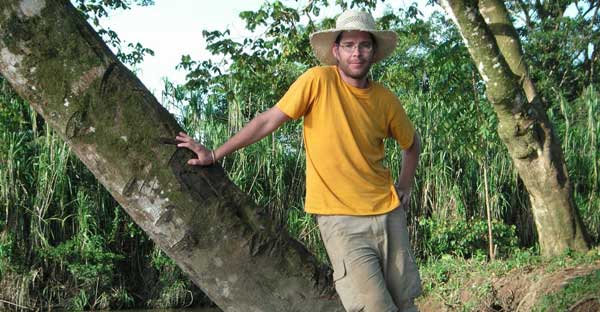
My friend and former colleague Matthew Power, who died March 10 of heatstroke on an assignment in Uganda, filled his brief life with curiosity and daring. It did not surprise me that Matt was hiking up the Nile—he was reporting a story for Men’s Journal about Levison Wood, a contemporary British explorer attempting to walk the length of the river—and it would not have surprised me had I read that he had been captured by bandits or rebels. But for someone so full of life to die at the age of 39 is especially tragic.
For days after hearing of his death, I thought about Matt quite a bit. I looked him up on Twitter and saw his last tweet, posted March 6: “@Wolfe321: you in Rwanda? I just transferred through Kigali en route to entebbe 2hrs ago.” I read tributes on Facebook from his large circle of friends. And I remembered how sweet and funny and kind he was, and how brave.
I had met Matt many years ago when he was a freelance fact-checker at Discover magazine and I was a staff editor. I called him “Matt Power, Man of Action,” because he would readily drop whatever he was doing to dash off to some remote corner of the world or to train-hop with hoboes. I had some insight into his activities because he sat in a cubicle opposite my office, organizing environmental demonstrations or working on his own articles. (Fact-checking was a sideline.) In 1999, in one celebrated feat, he dressed up as a sunflower and climbed a ginkgo outside City Hall in Manhattan to protest Mayor Rudolph Giuliani’s plan to auction off 112 community gardens.
In the years that followed, Matt traveled to 60 countries and all 50 states, as recounted in Nieman Storyboard, and his reporting took him to “jungles, deserts, mountains, rivers.” For an assortment of magazines that included Harper’s, GQ, and Heeb, he wrote about the destroyed Buddhas of Bamiyan in Afghanistan, the collapse of the Payatas garbage dump in the Philippines, drone operators in the United States, and his own youthful relationship with poet Allen Ginsberg.
After Matt left Discover, we’d meet occasionally for lunch—once in the cafeteria in the Condé Nast building, where he was fact-checking articles for House & Garden, as I recall—and another time in a vegan diner down on 14th Street in Manhattan. Over portobello mushroom burgers, he told me about his soon-to-be-published, first article for Harper’s, “The Poison Stream,” which described the poisoning of cashew farmers in the Indian state of Kerala after 20 years of spraying their crop with the organochlorine pesticide endosulfan.
People like to excoriate journalists for muckraking, but when I think of Matt I remember that good reporting requires courage, an open mind, a willingness to go where few others dare, and determination to pursue the truth. Matt embodied all of those qualities. He also loved the people of the world and lived life to the full. As he told the online magazine Longform, “The kind of stories I’ve gotten to do have involved fulfilling my childhood fantasies of having an adventurous life. Even though I don’t make a ton of money doing it, I’ve never felt like I was missing out on something.”
I am sad that we’ll never see him again.

